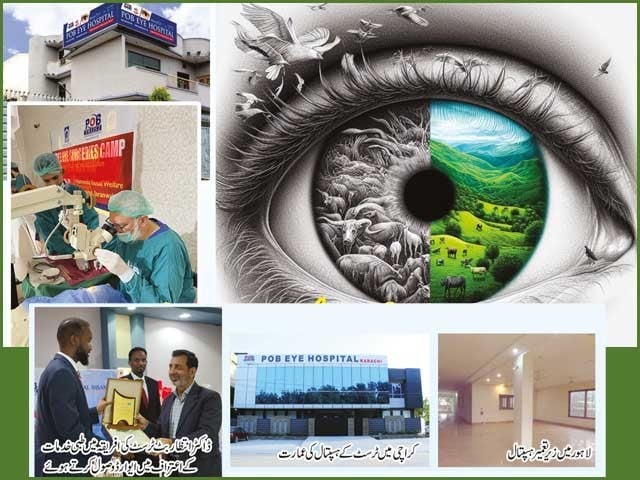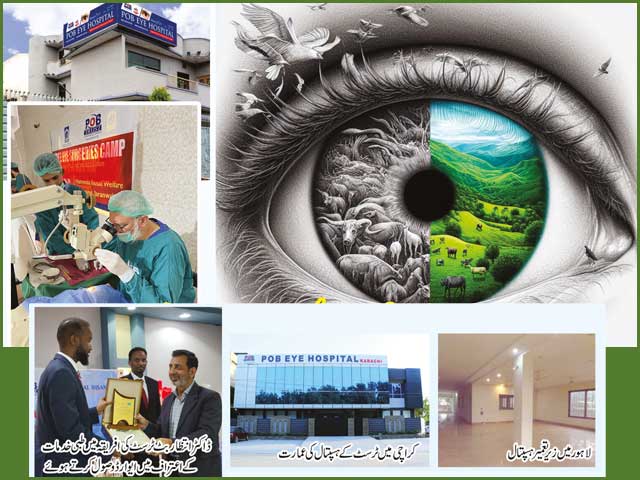
The trust’s second hospital in Lahore is in the final stages of completion, where 30 thousand patients will get the facility of examination and treatment every month. Photo: File
Eye diseases and their consequent total or partial blindness are major social problems in third world countries. The need to focus on this problem is because the vast majority of people who lose sight are those who could have been prevented from developing this disability through treatment.
The year 2020 has been of exceptional importance in relation to eye health at the global level, because the work done in the last two decades on the efforts launched by the World Health Organization in the name of ‘Right to Sight’. A review has been compiled. The review revealed how much progress has been made in achieving the ‘Right to Sight’ goals set under Vision 2020 and what challenges remain to be met.
If a person’s vision persists or deteriorates or decreases, it has extraordinary effects on the general health and quality of social life of such a person. Any eye disability adversely affects everything including social status, financial status, opportunities for work and education. According to the data of the World Health Organization, more than 43 million people worldwide are suffering from the disability of blindness, while another 295 million people are suffering from severe or partial disability and other eye disorders.
Here we are presenting an example from the year 1990 data only, before the start of the World Health Organization program, which will help to understand the situation. Eighty percent of those who went blind this year were those who could have been treated, that is, their sight could have been saved.
90% of all these patients were from developing countries, while 75% of the patients from developing countries were from Asia and Africa, and Pakistan is also located in Asia. In the year 2020, the number of patients suffering from blindness has doubled. The data released at the global level shows that if we talk about Pakistan, the number of people who have lost their sight due to serious eye diseases is more than 2 million and 80% of them are such patients. Which could be completely cured with the help of treatment.
Globally, 2.2 billion people are living with low vision or complete blindness, and one billion of them are curable. The total number of Pakistanis suffering from eye related medical problems is more than 8 million.
Globally, the resources currently being used for eye care are far less than the required resources. An additional $24.8 billion is needed to treat cataracts and other vision-affecting diseases worldwide. This extra money is urgently needed by the current global health system. Not only that financial resources are required but also a high level of planning and management structure is required to get full benefit from these financial resources. Today, millions of people in Pakistan and other parts of the world who are living with vision defects or complete blindness can live a healthy life if timely treatment facilities are available.
Lack of access to treatment is most likely due to lack of resources. Medical experts believe that more people are suffering from visual impairment or complete blindness than the available statistics suggest. According to experts, people who are currently suffering from partial or complete loss of vision, could have been saved from reaching this condition by spending 32 billion dollars.
It can be clearly estimated how much responsibility is imposed on the society itself and every person living in it, apart from the governments, to maintain this most important ability of the human body. To save millions of poor patients in Pakistan from drowning in darkness, extraordinary success can be achieved by people’s support of organizations that are providing free eye treatment facilities to the weak and underprivileged people of Pakistan. are
There are many projects working to help the poor and destitute people in Pakistan which can be described as exemplary. For example, in Pakistan’s most backward province of Baluchistan, there is an institution called ‘Al-Hijra Residential School and College’ working at the place of pilgrimage, which selects two students from the poorest families through a competitive examination from each district of the province. and then all the needs of these students are met in this residential school. Graduates from this institution are working in key positions in government and private sector.
This college in Ziarat started functioning in 2004. Now in the last year 2023, the second branch of the college has also started working in Dera Ghazi Khan. In this regard, an example can be given of ‘Akhot Foundation’, which has achieved extraordinary success in its program of putting the underprivileged on their feet. Under these poverty alleviation projects, 157 billion rupees have been provided to the needy people of the country since the establishment of the foundation in 2001 till date. Similarly, an organization working in the name of POB Trust (Prevention of Blindness Trust) is effectively helping people in the country and abroad who are not financially able to treat their eyes. This trust is a project of Pakistan Islamic Medical Association which was registered under the Trust Act in July 2007.
POB is working on a voluntary basis in the country under the objective of vision restoration and protection and has the distinction of being the largest organization in the country for free eye treatment. This trust is not only providing free treatment facilities but also playing its role in formulating strategies to prevent visual impairment and blindness. POB Trust is also a member of ‘The International Agency for the Prevention of Blindness’ for the ‘Right to Sight’ program under Vision 2020.
POB Trust organizes free i-camps in Pakistan and poor countries of the world. Training in eye surgery is provided under the trust. Children’s eye examinations are provided in schools and immediate treatment is provided to children who need it. Emergency relief activities are organized in case of natural calamities. Arrangements for examination and treatment of convicts in prisons, provision of social services, rehabilitation of blind persons are also being done on a regular basis.
Community centers are functioning in Jaranwala and Kharian managed by the trust. Trust’s Eye Hospitals are already functioning in Lahore and Karachi. While a new hospital is under construction in Lahore, awareness programs for eye care and treatment are also being run. The trust has so far organized 950 free camps for eye treatment in the country and abroad, especially in the poor countries of Africa, in which more than three and a half lakh patients have been operated for the treatment of various disorders, including white and black cataracts. have done
Further, so far 2.1 lakh patients have been examined and provided immediate treatment in the hospitals and camps of Braun Trust. Under the trust, 65,000 male and female students were examined for their eyes and provided with immediate treatment and provision of spectacles where necessary. Through the medical facilities managed by the trust, 30,000 people are provided eye examination and treatment facilities every month.
The trust’s new hospital for free eye treatment in Lahore is in the early stages of completion. This hospital is being constructed at a place of 7 km Raiwind Road. This hospital, built on an area of about five kanals, will start working in the next four to five months. According to trust sources, another amount of Rs 25 crore is required to complete the construction of the hospital, which is being raised through donations. When this hospital will start working, initially 500 to 1000 patients will be examined and treated daily. The operation theaters of the hospital will be able to perform 500 eye operations per month and there is scope to double this number later.
This hospital will also prove to be a source of training for doctors. Another important thing is that all the doctors and other staff participating in the treatment facilities within the country and abroad are doing this service for the pleasure of Allah without any financial gain. It is the collective responsibility of any society to generously encourage such projects of public service so that the chain of good works expands further.
(function(d, s, id){
var js, fjs = d.getElementsByTagName(s)[0];
if (d.getElementById(id)) {return;}
js = d.createElement(s); js.id = id;
js.src = “//connect.facebook.net/en_US/sdk.js#xfbml=1&version=v2.3&appId=770767426360150”;
fjs.parentNode.insertBefore(js, fjs);
}(document, ‘script’, ‘facebook-jssdk’));
(function(d, s, id) {
var js, fjs = d.getElementsByTagName(s)[0];
if (d.getElementById(id)) return;
js = d.createElement(s); js.id = id;
js.src = “//connect.facebook.net/en_GB/sdk.js#xfbml=1&version=v2.7”;
fjs.parentNode.insertBefore(js, fjs);
}(document, ‘script’, ‘facebook-jssdk’));



